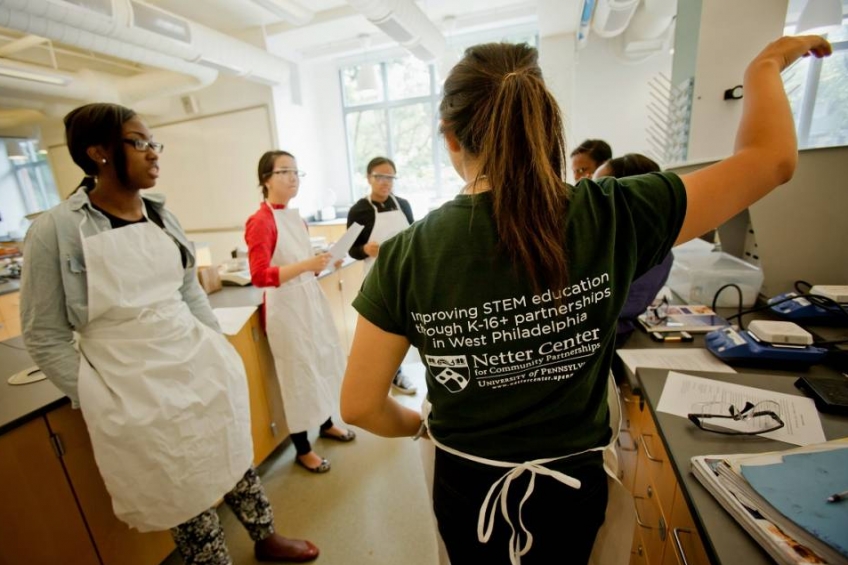Moelis Access Science Fellows and ABCS
Moelis Access Science (MAS) is anchored by STEM Academically Based Community Service (ABCS) courses, which integrate service with research, teaching, and learning. ABCS courses involve hands-on, real-world problem solving and help students become active, participating citizens of a democratic society. Approximately a dozen different ABCS courses in STEM disciplines are offered every year.
MAS fellows support school-day and after-school STEM instruction at University-Assisted Community Schools. During the school-day, MAS fellows partner with K-12 STEM teachers by co-developing and facilitating hands-on, inquiry-based activities, labs, and lessons. MAS fellows teach a range of subjects, which includes biology, chemistry, computer science, engineering, environmental science, and math. Each subject is led by Curriculum Chairs, who are graduate-level or senior undergraduate students that can advise MAS fellows on teaching and learning. Approximately 150 Fellows are involved with MAS annually.

Moelis Access Science Chemistry Days with Penn Intern Teaching
Moelis Access Science works to reinforce and make effective the core structure of existing STEM curricula in K-12 classrooms. The School District of Philadelphia has adopted local and state standards, and its schools select STEM materials from approved curriculum and textbooks. Moelis Access Science works with teachers to make the best use of these resources and helps teachers take advantage of supplemental resources to support inquiry-based learning. Implementing the School District’s core curricula in particular, and high quality science education in general, poses a number of significant challenges. The needs which Moelis Access Science has identified and seeks to address include:
- Professional development for teachers in both content areas and instructional strategies.
- Hands-on activities and inquiry-based learning activities that promote student engagement so that they actually learn science by doing science. These activities need to be locally appropriate, taking into account the capacities of school facilities and budgets, student reading and math levels, and specific Philadelphia learning goals.
- Human resources, i.e., Penn students, faculty and staff, to assist teachers with both the planning and the classroom implementation of hands-on and inquiry-based learning activities.
- Accurate, timely assessment of students’ readiness and achievement.
Moelis Access Science directly addresses all of these areas using an integrated approach that supports teachers and students as they engage in challenging STEM learning. The three central components to our approach are:
- Carefully designed professional development that is responsive to teachers’ needs, in both content areas and instructional approaches. Moelis Access Science fellows and Penn faculty design and lead sessions that are planned collaboratively with teachers, fellows, and program coordinators.
- Classroom support provided by Moelis Access Science fellows, Penn students from Academically Based Community Service (ABCS) courses, and Penn staff and faculty. Penn participants partner with teachers to assist with planning, designing, testing, and implementing labs, small group projects, discussions, and investigations.
- Mindful adaptation of hands-on investigations and inquiry-based strategies tailored to the needs of local classrooms. The material and human resources provided through Moelis Access Science enable schools to undertake modes of teaching and learning that are otherwise difficult to implement in many urban classrooms.
Through an ongoing evaluation process, we assess the operation of the program, its partnerships, and impacts, and then use evaluation data to improve and refine the program. We find that all three components are critical for making substantial change. We have found few other examples of programs, whether local or national, that bring these components together in a coordinated way (e.g., others might provide professional development for teachers, or hands-on and inquiry-based activities that teachers can use, or sometimes both, but they don’t provide the human resources and ongoing teacher partnerships to actually implement and sustain the work in the classroom). In this approach, all students, K-16+, learn science by actually doing science. Penn students have noted that their own sense of mastery of their fields of study and their ability to communicate about them effectively is enhanced as they “learn by teaching” and by modeling and fostering inquiry. We also include opportunities for the K-12 students to increase awareness of college and career opportunities in STEM fields.
